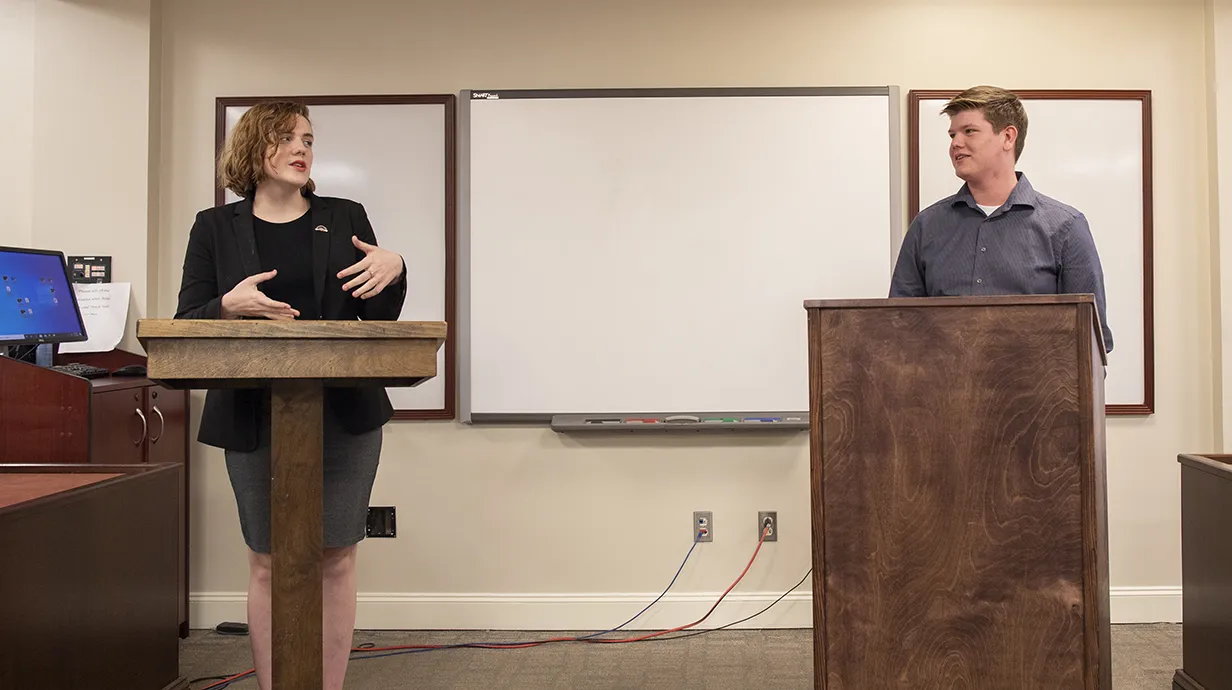PPL 212: Critical Thinking, Communication & Public Policy
Students learn to think and read critically and analyze arguments through deductive and inductive reasoning.
- Home
- Departmental Directory
- Liberal Arts
- Department of Public Policy Leadership
- Academics
- Critical Thinking, Communication & Public Policy

“Throughout the semester you learn how to effectively communicate arguments which is vital when working in a policy related field. Reflecting back on the class, I can confidently say that I came out able to think more critically and approach issues in a higher capacity.”
Molly Bowen
B.A. in Public Policy Leadership, minors in History and Political Science '26
We all spend a significant amount of time thinking about issues and policies that are important to us. Few of us, however, spend time thinking about how to think about those things. If we do not think critically and rationally about policy issues, we may not be creating or supporting the best policies for ourselves or for society, nor can we effectively argue for those policies. At the same time, the best arguments will fail if they are not communicated well. And in a society that seems increasingly polarized and uncivil, even the best arguments can go unappreciated. So, in addition to helping students improve their skills in thinking critically, this course is designed to help students improve their skills in reading, writing, and communicating civilly through written work, individual presentations, and debates.
In this course, students will learn the nature of arguments, the nature of deductive and inductive reasoning, common reasoning errors and how to avoid them, and some keys of good communication and public speaking. Students will also learn to apply their critical thinking skills in analyzing, criticizing, and strengthening arguments pertaining to contemporary issues in public policy.
By the end of the course students will be able to:
- Identify arguments and classify argument types
- Evaluate claims and support their evaluation with evidence or a counterexample
- Analyze and evaluate arguments to determine whether they are strong, valid, sound, or cogent
- Infer and critique implicit premises and assumptions in arguments
- Create, develop, and defend their own arguments for novel claims regarding public policy
- Charitably interpret and critique the claims and arguments of others
- Identify heuristics and reasoning errors and explain when and why they are problematic
- Communicate more effectively and confidently
- Synthesize the skills above to create persuasive presentations and engage in civil debates
In this course students partake in a debate on several different topics of interest that have been discussed throughout the semester and are relevant in the current policy world. They research two sides of one argument and come to class prepared to debate both.
This class is very heavy on open discussions and engagement which makes it more interesting and interactive. Dr. Vereb is very good at using analogies that makes sense to his audience and is a really cool guy. I enjoyed taking this class."
I found it very interesting to learn about different types of arguments. The course is interactive, which helps you learn the material better. The debates/presentations in the class felt very helpful to my future academic success."
Meet the Instructors
Kyle Fritz
- Associate Professor of Public Policy Leadership
Zach Vereb
- Assistant Professor of Public Policy Leadership
